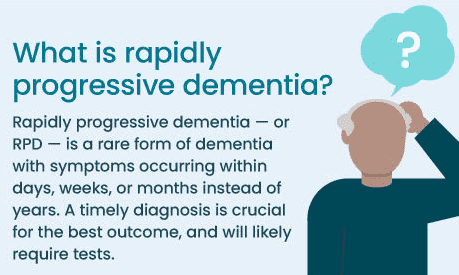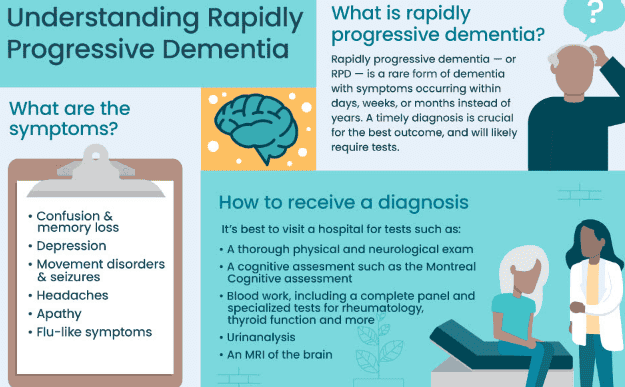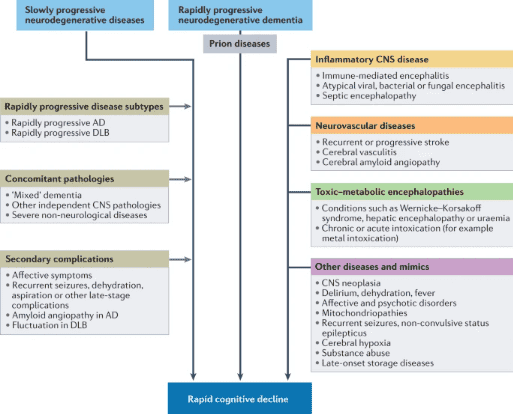Understanding Rapidly Progressive Dementias: A Guide for Families and Caregivers
Published on February 21, 2025
Updated on February 21, 2025
Published on February 21, 2025
Updated on February 21, 2025

Table of Contents
It can be worrying when a loved one starts to forget things more often or struggles with tasks that used to be easy. Sometimes, these changes can happen quite quickly, and this might be a sign of what doctors call Rapidly Progressive Dementias, or RPDs for short. These types of memory and thinking problems get worse much faster than usual.

RPDs are a group of diseases that cause a quick decline in brain function. This means that someone with RPD might start having trouble with memory or finding the right words when speaking. They might also feel different emotionally or act in unusual ways. These changes usually happen over a few weeks or months but can be sudden.
Noticing these changes early on is essential. If we spot the signs of RPD quickly, doctors can figure out what’s causing the problem sooner. Sometimes, the causes of RPD can be treated, which can help slow down the disease or even improve some symptoms. That’s why paying close attention and getting medical help when you notice something’s wrong can make a big difference.
It can be scary when someone we love starts to forget things or act differently. It’s like a puzzle where the pieces aren’t fitting together like they used to. Rapidly Progressive Dementias (RPDs) are like that—they’re a group of conditions in which the brain’s ability to think, remember, and reason changes quickly, sometimes in just a few weeks or months.

There are several reasons why someone might develop RPDs. It’s a bit like a storm – many different factors can come together to cause it. Some common causes include:
Understanding RPDs is a bit like being a detective. Doctors examine a person’s medical history—all the health information from the past—to find clues. They ask about symptoms, family health, and travel or chemical exposure. This helps them determine what’s causing the changes and how to help.
When a family member is diagnosed with an RPD, it can feel like a race against time. The good news is that doctors have several ways to help, and each person’s treatment plan is as unique as they are. It’s like having a toolbox where each tool serves a different purpose.
The treatments for RPDs aim to address the root cause of the dementia. For example, if an autoimmune disease is causing the symptoms, medications that calm the immune system might be used. If a vitamin deficiency is at fault, then vitamin supplements could be the answer. Sometimes, if the cause is an infection, antibiotics or antiviral medications can help. It’s important to remember that these treatments work best when the condition is caught early, so quick action is key.
Even when RPDs can’t be reversed, much can still be done to help someone feel better. Doctors might prescribe medications to ease symptoms like confusion or agitation. Some therapies can help with speech or movement problems. The goal is to make each day as good as possible, focusing on comfort and support.
Hospice care is a special kind that focuses on comfort and quality of life for people nearing the end of their life journey. It’s about ensuring your loved one is as comfortable as possible and surrounded by care and love. It’s not an easy decision to think about hospice care, but it can be a very caring choice when the time comes.
Knowing when it’s time for hospice can be hard. Generally, if doctors believe a person with a severe illness like RPD has six months or less to live, they might be eligible for hospice care. This doesn’t mean giving up; it’s about focusing on the quality of life and making the most of the time left. If treatments are no longer helping, or if they’re causing more discomfort than relief, it might be time to consider hospice care.
Moving to end-of-life care is a transition about respect, dignity, and support. It’s a time to focus on caring for your loved one’s needs, whether that’s managing pain, helping with breathing, or just being there to hold their hand. It’s also a time for families to come together, to share memories, and to support each other.
When a family member is facing the challenges of Rapidly Progressive Dementia (RPD), hospice care becomes a beacon of support. It’s like having a compassionate team joining your family to help carry the emotional and practical burdens of caregiving. Hospice provides medical care and emotional and spiritual support, helping families navigate this difficult journey.
Caring for a loved one with RPD can be overwhelming. Hospice care gives caregivers much-needed breaks, offering services like respite care, which allows caregivers to rest and recharge. Hospice also provides education and support, ensuring caregivers have the knowledge and resources to provide the best care for their loved ones.
Hospice offers a range of services tailored to meet the unique needs of RPD patients. These include pain and symptom management, assistance with daily activities, and emotional and spiritual care. The goal is to ensure the patient’s comfort and dignity while providing comprehensive family support.
As we end our guide on Rapidly Progressive Dementias (RPDs), it’s important to remember that you are not walking this path alone. The journey with RPD can be challenging, but there is support available for both you and your loved one. Embracing this support can make a significant difference in your experience.
Embracing Support means reaching out to healthcare professionals, joining support groups, and connecting with others who understand what you’re going through. It’s about accepting help when it’s offered and seeking it when you need it. This support can provide practical advice, emotional comfort, and a sense of community.
Finding Hope in the face of RPD is about cherishing the good days and finding joy in the small moments. It’s about celebrating the person your loved one still is, despite the changes brought on by dementia. Hope is found in the love you share, the memories you cherish, and the peace from knowing you’ve done all you can to provide comfort and care.
As you navigate the complexities of RPD, remember that your strength and love are powerful. They are the light that guides you through the darker times. Hold onto hope, lean on the support around you, and know that you are doing your best in a situation that requires immense courage and compassion.
Rapidly Progressive Dementia: Causes, Symptoms, Treatments
A Patient’s Guide to Rapidly Progressive Dementia (RPD)
Recognizing Symptoms and Causes of Rapidly Progressive Dementia
Recognizing Rapid Onset Dementia: Signs, Causes and How To Seek Help
Rapidly progressive dementias — aetiologies, diagnosis and management
Rapidly Progressive Dementia: Reasons for a Sudden Worsening of Dementia Symptoms
How to read and apply the FAST Scale to stage any type of dementia. Dementia Staging Made Easy
📚 This site uses Amazon Associate links, which means I earn a small commission when you purchase books or products through these links—at no extra cost to you. These earnings help me keep this website running and free from advertisements, so I can continue providing helpful articles and resources at no charge.
💝 If you don’t see anything you need today but still want to support this work, you can buy me a cup of coffee or tea. Every bit of support helps me continue writing and sharing resources for families during difficult times. 💙
Geri-Gadgets – Washable, sensory tools that calm, focus, and connect—at any age, in any setting
Dementia Caregiver Essentials: Comprehensive Guide for Dementia Care (one book that contains the ten books below for less than one-third the price of all ten)
Dementia Home Care: How to Prepare Before, During, and After
DEMENTIA DENIED: One Woman’s True Story of Surviving a Terminal Diagnosis & Reclaiming Her Life
Atypical Dementias: Understanding Mid-Life Language, Visual, Behavioral, and Cognitive Changes
Fading Reflection: Understanding the complexities of Dementia
Ahead of Dementia: A Real-World, Upfront, Straightforward, Step-by-Step Guide for Family Caregivers
Four Common Mistakes by Caregivers of Loved Ones with Dementia and What Do Differently (video)
Articles on Advance Directives
CaringInfo – Caregiver support and much more!
The Hospice Care Plan (guide) and The Hospice Care Plan (video series)
Surviving Caregiving with Dignity, Love, and Kindness
Caregivers.com | Simplifying the Search for In-Home Care
Geri-Gadgets – Washable, sensory tools that calm, focus, and connect—at any age, in any setting
Healing Through Grief and Loss: A Christian Journey of Integration and Recovery
📚 This site uses Amazon Associate links, which means I earn a small commission when you purchase books or products through these links—at no extra cost to you. These earnings help me keep this website running and free from advertisements, so I can continue providing helpful articles and resources at no charge.
💝 If you don’t see anything you need today but still want to support this work, you can buy me a cup of coffee or tea. Every bit of support helps me continue writing and sharing resources for families during difficult times. 💙
VSED Support: What Friends and Family Need to Know
Take Back Your Life: A Caregiver’s Guide to Finding Freedom in the Midst of Overwhelm
The Conscious Caregiver: A Mindful Approach to Caring for Your Loved One Without Losing Yourself
Everything Happens for a Reason: And Other Lies I’ve Loved
Final Gifts: Understanding the Special Awareness, Needs, and Communications of the Dying
How to read and apply the FAST Scale to stage any type of dementia. Dementia Staging Made Easy. (Video)
Understanding Dementia (Alzheimer’s & Vascular & Frontotemporal & Lewy Body Dementia) (Video)
How Do I Know Which Dementia I’m Looking At? (Video)
Geri-Gadgets – Washable, sensory tools that calm, focus, and connect—at any age, in any setting
Dementia Training material (Free)
Promoting Meaningful Relationships with Dementia Patients through Validation Therapy
Unlocking the Power of Validation Therapy in Compassionate End-of-Life Care
Validation Therapy: A Valuable Tool for Families and Healthcare Teams
Best Practices for Approaching Combative Dementia Patients
Dementia Insights: The Validation Method for Dementia Care
How Do I Know You? Dementia at the End of Life
Sundown Dementia, Vascular Dementia and Lewy Body Dementia Explained
Ahead of Dementia: A Real-World, Upfront, Straightforward, Step-by-Step Guide for Family Caregivers
Dementia Care Companion: The Complete Handbook of Practical Care from Early to Late Stage
Top 30 FAQs About Hospice: Everything You Need to Know
Understanding Hospice Care: Is it Too Early to Start Hospice?
What’s the process of getting your loved one on hospice service?